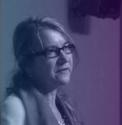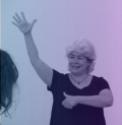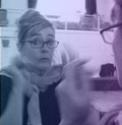How do I reflect our times?

Deborah Hunt: How do I reflect our times?
Deborah Hunt is an artist who makes masks and theatre puppets, a performer with over 45 years of experience in creating and playing original theatre works, mostly for adults. She was born in New Zealand, and has lived in Puerto Rico for 20 years, where she has continued developing her unique style of mask-making and object theatre. Thanks to her works she travels a lot and holds different workshops around the world. We had a chance to host her in Belgrade where, in cooperation with ACT Women, she held a mask-making workshop for the performance TIRED!
Now we have met at Magdalena Munich festival where Deborah had her performance ale 53: Snowhite and the workshop titled The Macanudos.
Within our local philanthropy program, we are using the chance to present Deborah`s work that inspires and motivates us!
Do you think it is important and why it is important to have feminist festivals and gatherings?
Yes, I think it is important that they exist, especially now, in these times we face, it is important for women to be able to join together, to share, to hear ideas of different radicalities, ideas that have to do with culture, with health, it is important to be able to share, to network, to sometimes disagree, just to be able to push out our own personal envelopes, because I think that does happen at these gatherings. So, yes, definitely it is important.
But why you said “especially now”?
Because I think these are dark times, times in which the rights and treatment of women generally, on the worldwide level, are very bad. I come from a more privileged place – I am an artist who can do whatever she likes just because I determined it that way. Not because I am comfortably supported but because for the past 45 years I have taken a risk and intended that this is what I do. But I know that for the most women in the world it`s not that way, so I think we are facing dark times. As an artist I ask myself, as Nina Simone said, how do I reflect our times? I think feminist gatherings and festivals are one way to reflect our times, and I just think that the discussion is possible and really important.
Do you think it`s important to invest money in women`s art and women`s human rights?
Of course, because we can`t do it for nothing. I mean, everything needs some money to be able to function, to push forward, so feminists also need money – to organize, to support different women, different moments on a long term basis. And also emergency funds, sometimes things happen and support needs to be directed very quickly. So, yes, absolutely
Do you know for some women’s, feminist foundations? Did you have experience with some of them?
To be truthful, I haven`t applied although after the hurricane in Puerto Rico in September 2017 suddenly there was no art work at all. There were priorities such as housing, electricity, food, they even couldn`t get through to people to give them food. So people needed certain other things first, but slowly money began coming in and the first people offering me support of 100 $ were from the feminist collective in Puerto Rico that does cultural work as well, that I had mentored before (Colectiva Feminista en Construccion). So the very first money that came in, this 100$, maybe that would buy food for a week… it was incredibly good… So when money came to them, they immediately tried to share it with not just artists but different women.
What solidarity means to you?
I don`t know why I think in kind of vaguely military terms – I think of like sisters in arms. I am not pro wars or battles, but I think of that closing ranks against the common aggressor or a common and detrimental way of thinking about our society – so solidarity can be making something very strong and militant, but it can also be listening at a time when a woman needs to be listened to. It can also be a monetary thing. It is also who do you favour, who do I listen to first… I don`t care if people like me or love me or not, but I totally respect and respond to people who acted with solidarity with me in the past and I think that`s sort of a true meaning of friendship. It`s not that you look to be paid back, it is just an action that you do to support, not to save for your own personal benefit, but to support and show you are on their side.
But now you have a situation in Puerto Rico that`s not so good. Can you tell us more of what`s happening right now and how you see possibilities for solidarity…
O.K., so what did happen just prior to the hurricane was really… the Puerto Rican government has for the long time – doesn`t matter which party – been corrupt and has mismanaged the money in Puerto Rico. So Puerto Rico was basically bankrupt, but because of it`s colonial relationship to the U. S. it could not declare the bankruptcy. The investors and hedge-fund people and what I call the evil people benefitting from this because a lot of money could be taken out of Puerto Rico. S o this junta was made to see what could be extracted; it is there to extract wealth in terms of resources, real estate; in terms of rights gained by unions, in terms of natural resources – to take the money out to repay these… these were really illegal things those people, investors mostly, have done. So there was already suffering, already there was the big depression, and then comes the hurricane. Where Maria went through, she took all the green, all the infrastructure, all the electricity and telephone poles that were never given maintenance. So ironic, since the head of the electric authority, a gringa was paid a fortune to correct things before the hurricane and she didn`t do it. So it was one thing on top of the other, and most of people in Puerto Rico, a huge percentage still do not have electricity, do not have roofs over their heads… it was a fucking disaster and it still is – so that`s phase two of the disaster, so in phase three of the disaster people are coming together, started opening community kitchens, tried to get water and food to people in the mountains and it was very difficult with no roads and it keeps raining and erosion gets worse and worse, so there still is a lot of community kitchens, a lot of solidarity but by people themselves, since federal agencies were slow and unorganized and the government made some disastrous and corrupt choices. So it was Puerto Rican people helping Puerto Rican people. And from the diaspora, the Latino community sent a lot of food, lot of money, lot of medicines, and another phase of corruption was in managing all that… there was no system, no plan B, people couldn`t plan anything, just total devastation, not in all but in big part of Puerto Rico. So now what is happening is that schools are going to be privatized, this is the plan, which means that all the rights the teachers have won over the years thanks to their unions will just be dismantled. Also the electric companies are going to be privatized and I heard, I can`t say this is absolutely true, that they are going to concentrate on where there is electricity, not where there is no electricity, so all these communities living in the mountains, some of them reasonably sized, some very far away, will not get electricity for a year, or it could be two years. Because the electrical company is bust and does not have enough electricity and has to ration the electricity – it`s like rationing what you don`t have. So it`s a mess and there is no plan that is not really continuing what was happening before – taking out the resources. So people leave, 300.000 people left after the hurricane because what do you do when you don`t have a house, what do you do when you have diabetic old parents and you can`t keep their medicines cold since there is no electricity and you can`t put them in the fridge, so people sent their families away or went to stay with their families or just left – going north into the winter, incredible… Now is happening the second wave, because the mortgages were put on moratorium, so if you have a mortgage on your house the bank will do you a favour and put a moratorium so you don`t have to pay for next 3 or 6 months, and people having no jobs anymore think “O.K. when the moratoriums are finished, the banks will take our houses away”. So there is the second wave of exodus of people. As an artist, a New Zealander who has been living in Puerto Rico for 28 years, as a leader of an independent puppetry and mask initiative, how do I reflect these times? What do I do? How can I make a difference? How can I show solidarity with the people who are in the mountains with just the cement foundations left of their houses, no walls and roofs? People who are in the worst scenario and have kids and schools are being closed down, and they need to send them to schools an hour away, but how when they have no cars, how when education system is being privatized – and it`s up to you to get there, there`s no school buses – and so on. And now there is another wave of vulture-people who are coming to buy land and houses cheap and the crypto, bit-coin people… When more and more people leave what do you have left? – Lack of professionals like doctors etc. and I guess the government thinks the rest will form part of the service industry… tourism.
So there is a lot of thinking and considering of what to do, what to do to survive ourselves but also how can we act when we know and see what is about to happen. I have explained in a simplistic way.
Now many parts of Puerto Rico are green again. Puerto Rico has a tropical climate and so things grow quickly. It doesn`t look like a war zone, you know, it is not Aleppo. You could think “Oh, it looks good” except for these pockets with no electricity, where water comes on and off, and that`s not to complain because there are people living way worse… And suddenly the bills for electricity are coming in for 300-400-500 $ where they used to be 50$, and it`s a mess…
Thanks a lot.





